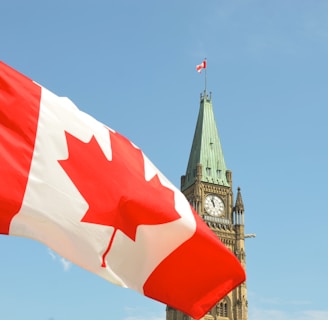Trump’s Trade War with Canada: A Distraction or a Disaster in the Making?
4/28/20253 min read


Trump’s Trade War with Canada: A Distraction or a Disaster in the Making?
The Sparks Fly: A Trade War Ignites
In January 2025, the U.S.-Canada relationship took a fiery turn when former President Donald Trump, back in the White House, reignited the "51st state" conversation. David Jacobs (@DrJacobsRad) captured the moment on X, sharing a CTV News Atlantic clip featuring Pierre Poilievre, Canada’s incoming Prime Minister, responding to Trump’s tariff threats. Jacobs called it a "distraction from a distraction," suggesting Trump’s trade war was a smokescreen for domestic inflation woes. But is there more to this than meets the eye? Let’s dive into the chaos.
The 51st State Fantasy: A Political Ploy?
Trump’s rhetoric about Canada joining the U.S. as the 51st state isn’t new—but it’s certainly bold. On March 12, 2025, Axios reported Trump imposing, then reversing, new tariffs on Canada after Ontario backed off taxing electricity exports. Trump claimed this would make "all Tariffs, and everything else, totally disappear." Canada, unsurprisingly, rejected the idea of surrendering sovereignty. Incoming PM Mark Carney vowed to keep tariffs on until the U.S. showed "respect" for fair trade. The X thread reflects the skepticism: @NorthernGannicus asked, “What if Trump is deadly serious?” while @ScottRCarpenter mused that nine years of Liberal governance might leave Canada with “no choice.” Is this a real threat, or just Trump’s negotiation theatrics?
Poilievre’s Counterpunch: A Plan for Canada
Pierre Poilievre, poised to lead Canada, didn’t mince words. In a March 4 speech on Parliament Hill, reported by CBC News, he accused Trump of “stabbing America’s best friend in the back” with 25% tariffs on Canadian goods. His plan? Counter-tariffs, tax cuts, and a push for home-building and resource development. Poilievre argued these were already Conservative priorities, now made urgent by Trump’s aggression. X users like@gwgmtweets echoed the need for pipelines and refineries, noting Canada’s costly reliance on selling cheap oil to the U.S. and buying back refined fuel. But @Paul17072693297 pushed back, insisting there’s “no trade war”—just a border security issue. Who’s right?
Security Concerns: Fentanyl and the Border
Trump’s tariffs aren’t just about trade—they’re tied to security. A February 2025 White House statement expanded a national emergency to address fentanyl trafficking across the northern border, blaming Canada for not doing enough to stop drug cartels. Mexican cartels are reportedly operating fentanyl labs in Canada, per the report, fueling a U.S. public health crisis. X user
@stirlingmg highlighted Canada’s vulnerabilities: a porous northern border, foreign-influenced MPs, and inadequate defenses. @Phil_Rack2 agreed, urging Canada to tackle fentanyl trafficking and rebuild its military. Is Canada really a security threat, or is this another Trump exaggeration?
Economic Fallout: Who Pays the Price?
Trump’s tariffs, initially set at 25% on steel and aluminum (later bumped to 50%), aim to pressure Canada but come with a cost. The Tax Foundation estimated in April 2025 that these tariffs could raise U.S. household costs by $1,300 annually, increase federal revenue by $166.6 billion, but shrink GDP by 0.8%. Inflation, already a concern, might worsen—supporting Jacobs’ “distraction” theory. Canada’s counter-tariffs, valued at $60 billion, target U.S. goods, escalating the economic standoff. @Zach_mexico speculated on X that Canada might be used by globalist forces like the WEF to undermine Trump. Is this trade war a strategic misstep, or a calculated risk?
A Distraction or a Deeper Game?
Jacobs’ post nails a key question: Is this trade war a distraction? Trump’s domestic challenges—rising inflation, political polarization—might benefit from a foreign scapegoat. But the X thread reveals deeper issues: Canada’s economic dependency on the U.S., border security gaps, and the fentanyl crisis. @TinHattington argued the real issue is North American security, not trade, while @missdebbie71 blamed Trudeau’s incompetence for the mess. The stakes are high, and neither side seems ready to back down.
What’s Next for U.S.-Canada Relations?
As of April 27, 2025, the U.S.-Canada trade war remains a tense standoff. Poilievre’s leadership could shift Canada’s approach, but Trump’s unpredictability keeps everyone guessing. Will this lead to a stronger North American alliance, or a fractured relationship? Only time will tell—but the conversation is far from over.
Thought Questions to Ponder
Do you think Trump’s “51st state” rhetoric is a serious proposal, or just a negotiation tactic? Why?
How should Canada balance economic retaliation with maintaining a strong U.S. partnership?
Is the fentanyl crisis a fair reason for Trump to pressure Canada, or an overreach? What’s your take?
Let me know your thoughts in the comments—I’d love to hear your perspective on this unfolding drama!
hello@boncopia.com
+13286036419
© 2025. All rights reserved.